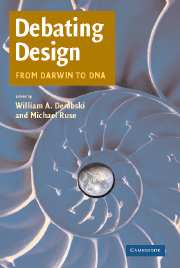Book contents
- Frontmatter
- Contents
- Notes on Contributors
- Debating Design
- INTRODUCTION
- 1 General Introduction
- 2 The Argument from Design
- 3 Who's Afraid of ID? A Survey of the Intelligent Design Movement
- PART I DARWINISM
- PART II COMPLEX SELF-ORGANIZATION
- PART III THEISTIC EVOLUTION
- PART IV INTELLIGENT DESIGN
- Index
- References
3 - Who's Afraid of ID? A Survey of the Intelligent Design Movement
Published online by Cambridge University Press: 05 June 2012
- Frontmatter
- Contents
- Notes on Contributors
- Debating Design
- INTRODUCTION
- 1 General Introduction
- 2 The Argument from Design
- 3 Who's Afraid of ID? A Survey of the Intelligent Design Movement
- PART I DARWINISM
- PART II COMPLEX SELF-ORGANIZATION
- PART III THEISTIC EVOLUTION
- PART IV INTELLIGENT DESIGN
- Index
- References
Summary
A SURVEY OF THE INTELLIGENT DESIGN MOVEMENT
Intelligent Design (ID) argues that intelligent causes are capable of leaving empirically detectable marks in the natural world. Aspiring to be a scientific research program, ID purports to study the effects of intelligent causes in biology and cosmology. It claims that the best explanation for at least some of the appearance of design in nature is that this design is actual. Specifically, certain kinds of complex information found in the natural world are said to point convincingly to the work of an intelligent agency. Yet for many scientists, any appearance of design in nature ultimately derives from the interplay of undirected natural forces. What's more, ID flies in the face of the methodological naturalism (MN) that prevails throughout so much of science. According to MN, although scientists are entitled to religious beliefs and can entertain supernatural entities in their off time, within science proper they need to proceed as if only natural causes are operative.
As compared to its distinguished colleagues – Darwinism, self-organization, and theistic evolution – Intelligent Design is the new kid on the block. Bursting onto the public scene in the 1990s, ID was greeted with both enthusiastic acceptance and strong opposition. For some, ID provides a more inclusive and open framework for knowledge that reconnects science with questions of value and purpose. For others, ID represents the latest incarnation of creationism, a confusion of religion and science that falsifies both.
- Type
- Chapter
- Information
- Debating DesignFrom Darwin to DNA, pp. 32 - 52Publisher: Cambridge University PressPrint publication year: 2004
References
- 1
- Cited by



